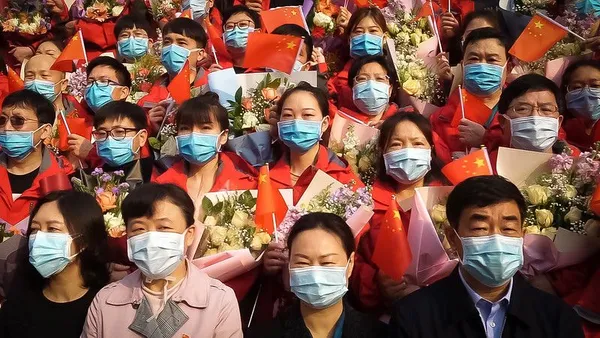Eye For Film >> Movies >> In The Same Breath (2021) Film Review
In The Same Breath
Reviewed by: Amber Wilkinson

Director Nanfu Wang proved adept at using her own personal story as a jumping off point for wider documentary considerations in Hooligan Sparrow and One Child Nation (co-directed with Jialing Zhang) and she employs the technique again with her latest, In The Same Breath, to help us to step into the world of Wuhan's Covid pandemic.
As Wang pointed out yesterday, ahead of her film's world premiere at Sundance Film Festival, last year, the news that Wuhan was locking down broke on the eve of the event - when she was in Utah with her husband, ready for jury duty, and her young son was having a holiday with his gran in Wuhan. This small story - which ended with her husband fetching their son home quite quickly - is just one of many, much more tragic, experiences related here but it's the reason why this film became a personal project for Wang, and you can feel that connection thrum continually through her narration of it.
Last year, 76 Days thrust us like flies on the wall, into the overwhelming situation in the hospitals of Wuhan at the time and the resulting film is emotionally moving, if scattergun. By comparison, Wang's film is much more structured and probing - looking at the way that propaganda and disinformation, in China and the US, has become as much a part of the story as the virus itself and the way that this has, in all likelihood, made the situation considerably worse than it might have been.
There's a reflexiveness to her filmmaking, as she explains her thought processes and challenges, via narration, as the action flows – with her childhood in China and her current life in the US she is able to offer a clear-sighted assessment of both ways of life that throws up insightful questions. We learn how she recruited her cinematographers and how, initially, they kept turning off their cameras every time someone was about to say something negative. She found ways around this - but this is the first indication of the bigger picture debate she sparks with her film, the notion that news was somehow being 'shaped' for consumption, accentuating the positive, even as the hospitals were filling to breaking point. She also has an eye for strong images – a bridge in Wuhan, lying empty, tower blocks of homes, each light a family, as recordings plays of people talking of who has been lost.
There are lots of stories here. Recordings of the stage management of hospital workers - "Say, 'Go Wuhan! Go China!'", we see them told – and clear indications that the virus was spreading widely long before China acknowledged it, with Wang returning repeatedly to an earlier January news report of doctors being arrested for "spreading rumours", while showing footage from a clinic near the wet market at the centre of the outbreak with a steady flow of sufferers in late December. This isn’t just a tale of Chinese manipulation, however, as Wang goes on to show how America, too, played down the story initially, in ways that chillingly mirror what happened in Wuhan. Medics who speak out about the lack or inadequacy of personal protective equipment were accused of “spreading rumours”, with some losing their jobs, and even Anthony Fauci, now considered by many as a speaker of truth to power, says: “People shouldn’t be wandering around wearing masks.”
Wang draws us close to the lived experience of those who have brushed close to Covid – families who have lost relatives, many of whom were denied hospital treatment because of overcrowding – and medics, in China and the US, who don’t need to tell us how traumatised they are because we can see it in their eyes. Information is power but misinformation and disinformation are corrosive – once people stop believing what they’re told, conspiracy theories and anti-lockdown protests beckon. There are no easy answers but Wang shows us that none of us is immune to political manipulation, no matter what regime we live under and that the best vaccine is to hold those in power to account.
Reviewed on: 29 Jan 2021















